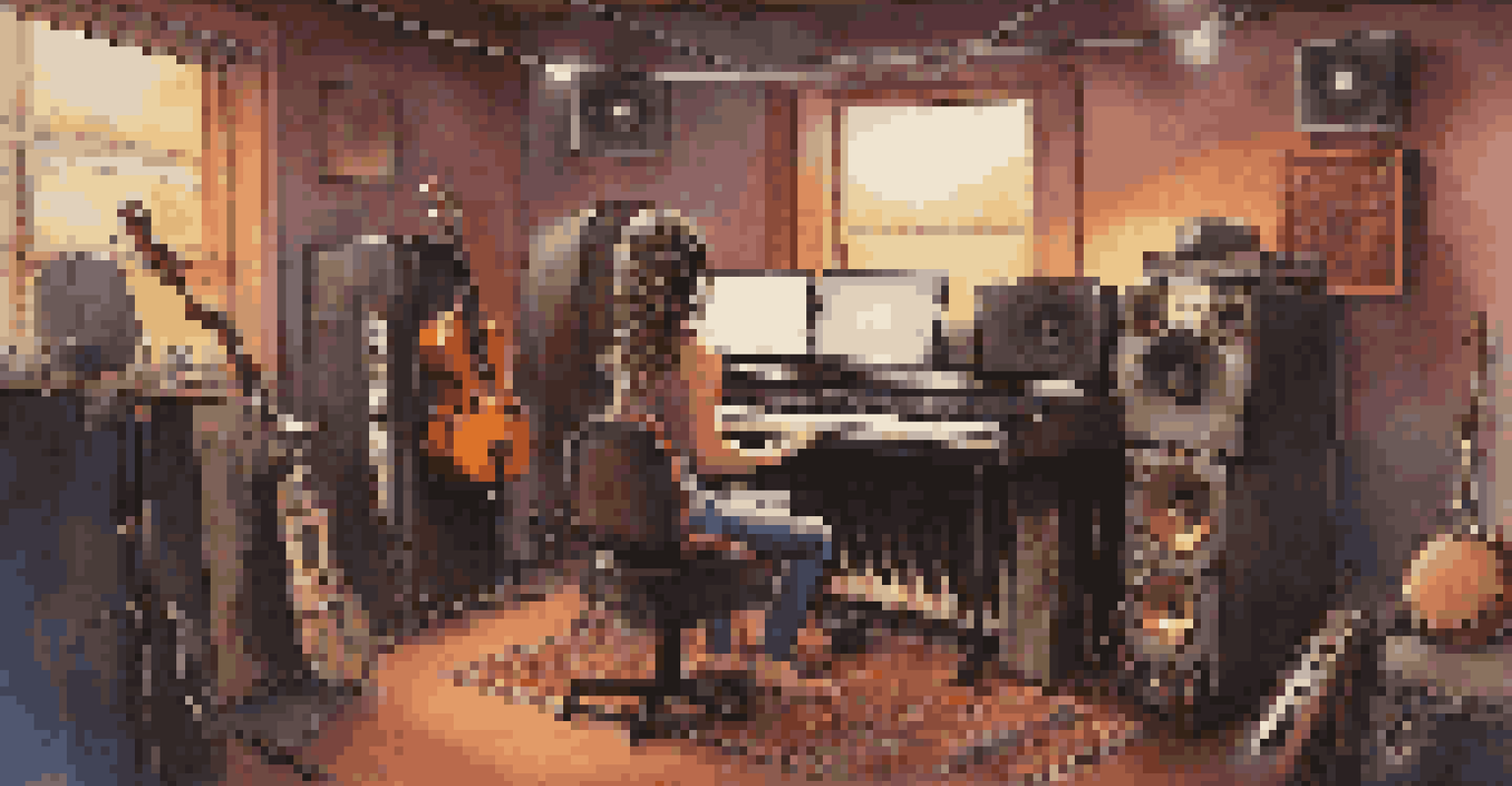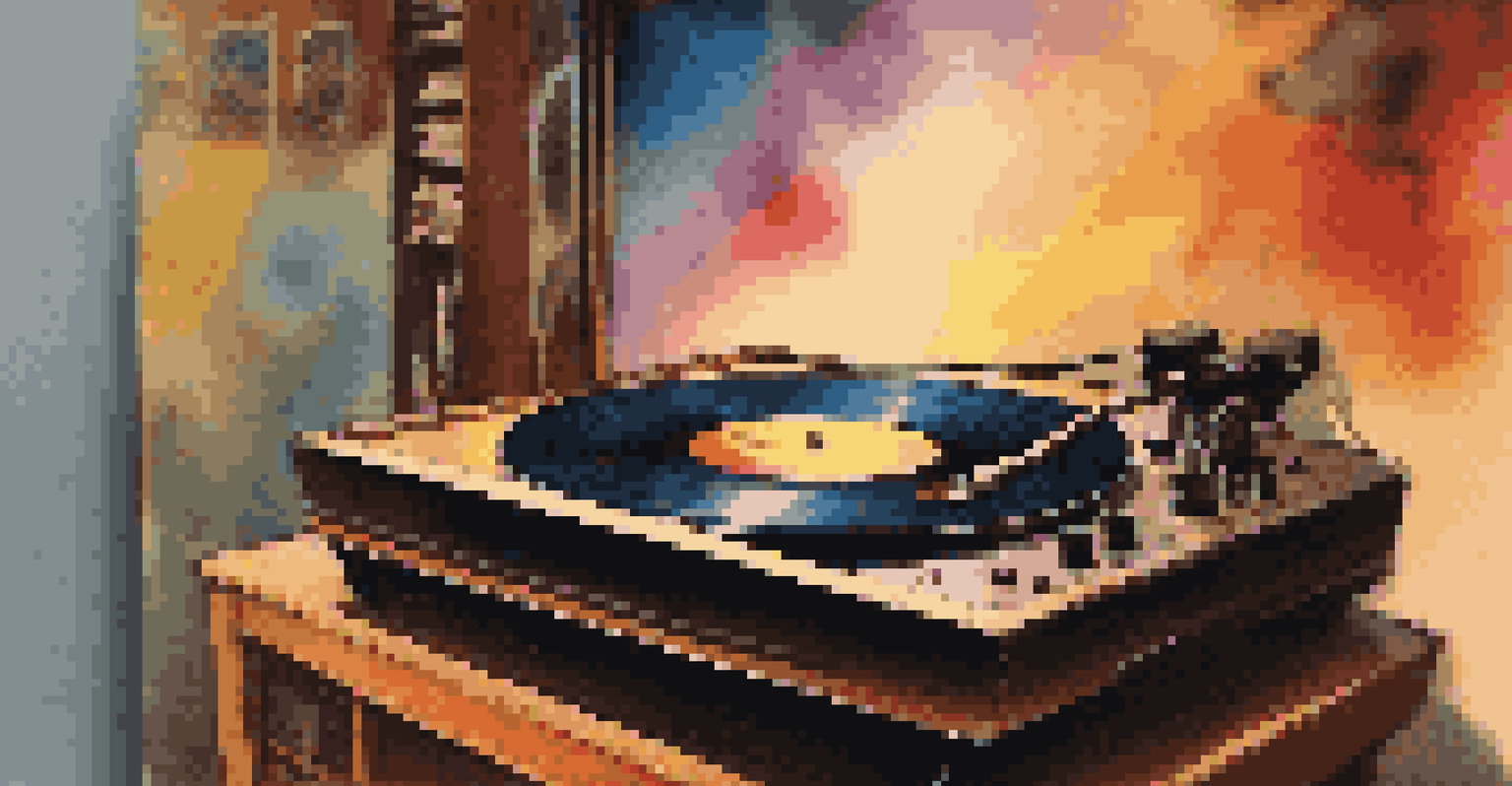Exploring the Interconnection of Music Genres in Global Culture

The Universal Language of Music: A Global Perspective
Music has long been regarded as a universal language that transcends borders. No matter where you go, you can find melodies that resonate with emotions and experiences alike. This shared understanding fosters connections among diverse cultures, creating a vibrant tapestry of sound that reflects humanity's collective journey.
Music is the universal language of mankind.
As genres evolve, they often borrow elements from each other, leading to exciting new blends. For instance, when reggae from Jamaica met hip-hop from the United States, it sparked a fusion that energized both styles, creating something entirely fresh. This cross-pollination showcases how interconnected our world truly is, with music serving as a bridge between different cultures.
In essence, music acts as a cultural ambassador, helping us appreciate our differences while celebrating our similarities. Through shared rhythms and lyrics, we create a sense of belonging that strengthens community ties. As we explore these connections, we can better understand the rich narratives that define our global culture.
Historical Influences: How Genres Evolve Over Time
Every music genre tells a story, often rooted in the socio-political landscape of its time. For example, the blues emerged from the African American experience in the Deep South, reflecting struggles and resilience. Over time, this genre influenced rock and roll, showcasing how historical events shape musical evolution.

As cultures interact through migration and colonization, music genres adapt and transform. The sounds of traditional Irish folk music have blended with American country, resulting in an entirely new genre that honors its roots while embracing innovation. This ongoing evolution illustrates how history continually influences musical expression.
By examining the historical context of various genres, we gain insights into how music mirrors the human experience. It invites us to reflect on our past while inspiring future generations to create and innovate. Ultimately, understanding these historical influences enriches our appreciation for the diverse sounds that make up our global music landscape.
The Role of Technology in Music Genre Fusion
In today's digital age, technology plays a crucial role in the fusion of music genres. With the rise of streaming services and social media, artists can easily share their work with a global audience. This accessibility allows for the rapid exchange of ideas and styles, leading to exciting collaborations that break traditional genre boundaries.
Without music, life would be a mistake.
Consider how platforms like YouTube and TikTok have transformed the music industry. A single viral video can catapult an unknown artist into the spotlight, blending genres in ways we never thought possible. Artists are now experimenting with sounds from around the world, creating unique fusions that resonate with fans across cultures.
Moreover, technology has also democratized music production, allowing anyone with a computer to create and share their music. This shift empowers artists to draw inspiration from diverse influences, resulting in innovative sounds that reflect our interconnected world. As we embrace these technological advancements, we can look forward to an ever-evolving musical landscape.
Cultural Exchange: Festivals and Global Collaboration
Music festivals have become melting pots of cultural exchange, where genres collide and create vibrant new sounds. Events like Coachella and Glastonbury showcase a range of styles, bringing together artists from various backgrounds and traditions. These festivals foster an environment of collaboration, encouraging musicians to experiment and innovate.
Take, for instance, the rise of Afrobeat in the global music scene. Artists such as Burna Boy and Wizkid have successfully introduced this genre, blending traditional African rhythms with modern pop and hip-hop. Their international tours and performances demonstrate how cultural exchange can elevate a genre to new heights, reaching audiences far beyond its origins.
As we celebrate the diversity found in music festivals, we also witness the power of collaboration. Artists often find inspiration in each other's work, leading to unexpected partnerships that enrich the musical landscape. This spirit of unity showcases the profound impact of cultural exchange in shaping the music we love.
Local Sounds and Global Recognition: The Rise of Indie
Indie music has emerged as a powerful force in the global music landscape, often drawing from local traditions and sounds. Independent artists frequently embrace their cultural roots, blending them with contemporary influences to create something uniquely their own. This authenticity resonates with listeners, paving the way for global recognition.
Consider the rise of Latin music in the mainstream, driven by independent artists who infuse traditional elements with modern beats. Genres like reggaeton and bachata have gained immense popularity, showcasing how local sounds can capture the world's attention. This trend highlights the importance of supporting indie artists as they bring their cultural narratives to the forefront.
As we explore this indie music movement, we can appreciate the richness of diverse voices and perspectives. By promoting local sounds and stories, we contribute to a more inclusive global music scene that celebrates the beauty of cultural diversity. Ultimately, indie music serves as a testament to the power of self-expression in a connected world.
The Impact of Globalization on Traditional Genres
Globalization has brought both opportunities and challenges to traditional music genres around the world. While exposure to international audiences can help preserve these art forms, it can also lead to commercialization that dilutes their authenticity. Striking a balance between maintaining tradition and embracing change is crucial for the survival of these genres.
For instance, traditional folk music from various cultures is often blended with modern elements to appeal to younger audiences. While this fusion can breathe new life into these genres, it risks overshadowing the original storytelling and cultural significance. It's essential to recognize and honor the roots of these traditions as they evolve.
Ultimately, globalization presents an opportunity to celebrate and promote traditional music on a global scale. By acknowledging the importance of these genres in their original context, we can cultivate greater respect for cultural heritage. This awareness allows us to appreciate the beauty of music while ensuring that traditional sounds continue to thrive.
The Future of Music Genres in a Connected World
As we look ahead, it's clear that the future of music genres will be shaped by continued globalization and technological advancements. Artists will increasingly draw from a vast pool of influences, leading to exciting new sounds that reflect our interconnected society. This evolution promises to keep music dynamic and ever-changing.
Moreover, the rise of virtual reality and immersive experiences may redefine how we engage with music. Imagine attending a concert where artists from around the world collaborate in real-time, creating an unforgettable experience that transcends geographical boundaries. Such innovations could further blur the lines between genres, leading to a more integrated musical landscape.

In conclusion, the future of music genres is bright and full of potential. As we celebrate the rich tapestry of sounds, we also embrace the connections that music fosters across cultures. By remaining open to new influences and collaborations, we can look forward to an exciting and diverse musical journey ahead.